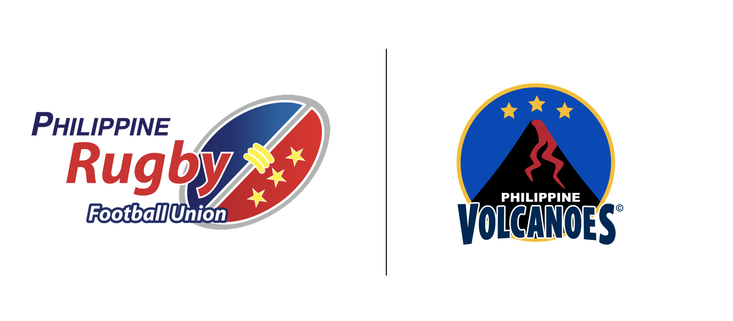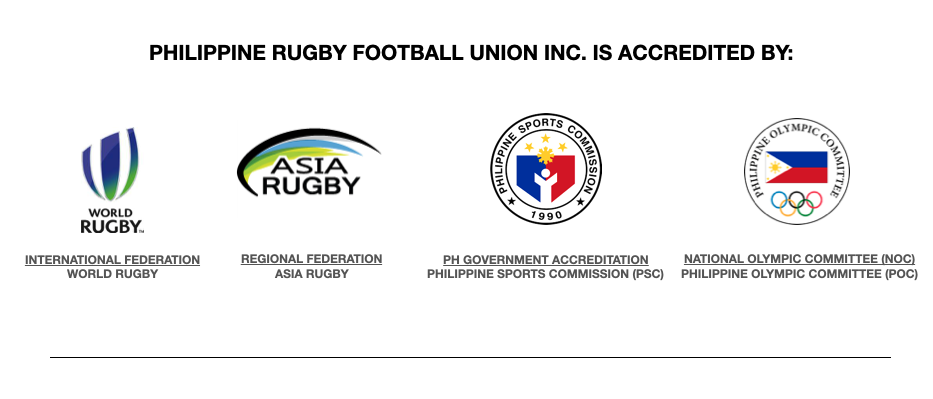|
After the earthquake in Christchurch, I began this article by saying that I had never experienced one. I didn’t get a chance to finish the article because I got called up to do some coaching in Japan and little did I know that within a few days I would be in the middle of the world’s fifth ever largest earthquake. At the time it hit, I was on the rugby field coaching a high school team in Kashiwa. Initially the ground shook and trees began to shake then the fluctuations increased and the buildings swayed. The school children started running from the classrooms and all assembled on the field. I was surprised at how calm the students were. I thought perhaps that this was a usual occurrence in Japan but everyone I asked said they had never experienced anything like it. Thirty minutes later, we were hit with a second tremor, equal to that of the first and everything rocked for two minutes. It was like trying to walk on a waterbed (if you’ve ever done that before). That afternoon I was slightly dizzy and over the next few days there were another 200 plus tremors. I remember on that first night being woken up three times with the bed and ground shaking wildly. During the whole time, the internet never went down and so we were informed very quickly of the horrific damage the earthquake and tsunami had caused. Immediately we checked on the families of the team and some could not be reached. We also lost contact with our manager who afterwards told us he was driving over a bridge when the earthquake struck and he thought he would tip into the bay. Our interpreter was not able to contact his father for a week but in the end he was found safe and well. 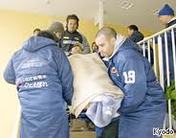 One of the coastal towns that was severely hit by the tsunami was Kamaishi, a town with a professional rugby team ironically called the “Seawaves”. The foreign players in that team, Scott Fardy, Pete Miller and Pita Alatini were lucky to escape death. When the Australian officials were able to finally contact them they told them that they wanted to stay in the town to help their local team mates and their families rather than be airlifted out. What a great act of heroism on the part of those players! The northern coastal towns have been utterly devastated with reports now estimating deaths and missing persons reaching 25,000. Meanwhile in Tokyo, after a week of food shortages, blackouts, 5-hour long queues for petrol and general chaos, they are now battling the threat of a nuclear meltdown. But the Japanese people are a stoic race. They will rise from this adversity as they have always learnt from an early age to be so tough on themselves. It shows through in their rugby and it will show through now as they rebuild their country and their lives. I keep them daily in my thoughts and prayers. So what was going to be my point after the Christchurch disaster? Well, the team from that city, the Crusaders, were devastated on so many fronts. Being in the midst of such turmoil and loss would have tested the bravest of characters. Their home ground was deemed unfit to play on, their training schedules were disrupted, not to mention the emotional stress from their proximity to death and destruction. 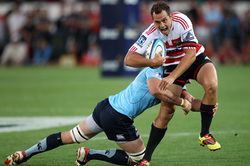 The Waratahs were their following opponents and of course they stood no chance of winning. The 33-18 score line was only made to look slightly respectable after a late try to the visitors. The Crusaders dominated all aspects of the game with their midfield trio of Dan Carter, Sonny Bill Williams and Richard Fruen making a mockery of the Waratahs supposed iron-defence. Previous to this game the Waratahs hand only conceded a total of just two penalty goals. We know of so many English soccer teams who have sacked their coach mid-season only to come out the following week to win despite the turmoil. We know the human will is capable of almost anything when it is severely challenged. But often it takes factors outside of us to make us react and to get us to perform at our peak. True champions are those who can challenge themselves without the need for external stimuli. The self-discipline needed to excel in rugby is enormous. It is primarily learnt off the rugby field in life’s non-rugby challenges. As many of our players juggle rugby with professional work or study, it is even more imperative that we execute our tasks to the best of our ability always. This is why I’m so confident that Japan will recover quickly from this tragedy. I will be taking a break from this column whilst the Volcanoes host the Hong Kong national team in Manila. We look forward to the challenge from the number 3 ranked team in Asia and I encourage you all to attend the game. After the break I plan to use this column to focus on more the tactical issues surrounding the modern game. Photos courtesy of Nikkei.com and TNT Magazine.com 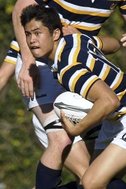 Alex Aronson During my recent visit to Las Vegas for the IRB 7s, I was pleasantly surprised by the number of Fil-Ams making a name for themselves on the American rugby scene. One of our brightest prospects there is Alex Aronson, a 20-year old fly-half playing at Cal Berkeley, the undisputed No. 1 university rugby program in the USA. Since 1984 when the legendary Jack Clark took over as head coach, Cal has won a staggering 21 national titles. Last Saturday, Aronson was the starting fly-half against Air Force and contributed 25 points in their 90-0 victory. The dilemma for many of our Filipino-heritage rugby players is the choice between trying to break into an established national union or to contribute to the PRFU in a more substantial role. Under IRB laws, a player can only represent one national union after turning 18 years of age. I’m hoping that as we progress through the international ranks, the decision to commit to the PRFU will be made easier due to the higher levels in which we will compete. 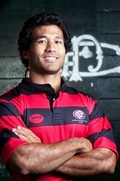 Volney Rouse The number of Filipino-heritage rugby players who are now internationals with other unions is growing steadily. The latest of these was Volney Rouse, a fly-half at San Francisco Golden Gate in the USA Super League. 27-year old Rouse attained his first cap for the American Eagles in 2010 playing against Russia in the Churchill Cup. Rouse, like Aronson, is a point scoring machine with his ability to run at the defence line and his goal kicking accuracy. Rouse attended St. Mary’s College of California and after taking up the game late, he twice achieved All-American honours. In 2009 he led his San Francisco Golden Gate team to the Super League title. In order to improve his chances of selection with the Eagles, Rouse decided to take up an offer to play rugby in New Zealand. This certainly paid off for him as he gained selection to the national team shortly after. One of the most recent additions to the Wallabies squad is 21-year old Queensland Reds flyer Rod Davies. In the 2010 Super14 season, Davies scored some blistering tries, most notably the one against the Crusaders. A hamstring injury prevented him from completing the season but he had shown enough potential to be picked in the Wallabies European tour. 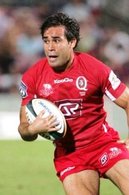 Rod Davies Davies went to Ipswich Grammar and was the GPS 100m sprint champion with a time of 10.81sec in his final year of high school. In 2008, he played for the Australian U20s at the World Championships. Recently at the Reds’ pre-season training he was crowned the fastest player with many calling him the fastest man outright in rugby. Both his national coach Robbie Deans and his provincial coach Ewen McKenzie believe that Davies will only improve with time. This is only his third year of professional rugby after having had a stint in rugby league with the Brisbane Broncos. Davies visited the Philippines in 2009 to help run some coaching clinics with the PRFU. He has a soft spot for the country and eagerly awaits another opportunity to help develop the local game. For the time being he is focused on remaining injury fee in order to push for World Cup selection with the Wallabies at the end of the year. 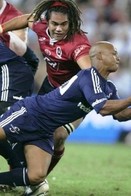 AJ Gilbert Another Fil-Aus player who has attained national honours is 23-year old AJ Gilbert. Born in Dorrigo, northern NSW, Gilbert was a member of the Australian U19 team which won the World Championships in 2006. In the same year he was picked for the Australian 7s team and also signed a contract with the Queensland Reds under Eddie Jones. Gilbert named George Smith as his childhood hero and comparisons were easy to make. At the time, not only did they feature matching dreadlocks but they were both flankers who played hard on the ball. So there is no question that Filipinos all over the world have got the talent to succeed in this sport. The PRFU is dedicated to growing the game locally as well as internationally. Our Filipino-heritage players who are based abroad will hopefully guide the Volcanoes to further international success. They will be the heroes that the local players will aspire to be. They will be the players who will ensure our next generation continue the high standards already set. Recently I was fortunate enough to attend a 4-day conference held in Sydney for Level III rugby coaches. Amongst those in attendance was a mixture of Super 15 and Premiership coaches from all over Australia. The presentations included the following: ∙ Owen Finegan (former Wallaby) on lineouts ∙ Marco Caputo (Brumbies Coach) on scrums ∙ Stephen James and Matt Burke (former Wallabies) on catch-pass skills and kicking skills ∙ Baden Stephenson (Sydney University) on innovative starter plays ∙ Peter Harding (ARU S&C Coach) on the latest trends in strength and conditioning ∙ Peter Jenkins (ARU Marketing and Media Manager) on how to deal with the media ∙ Andrew Sullivan (ARU) on video analysis ∙ Jamie McGregor (ARU) on game management from a referee’s perspective I list them here so that those aspiring to be coaches can gain some insights into the many facets of being a head coach. And the list is only partially complete as we also attended another course last year which included; attack, defence, personality profiling, skill acquisition, periodisation planning, mental toughness and mentoring. The highlight of the entire course was the visit of Australian National Head Coach, Robbie Deans. He shared with us his experiences from the Wallabies’ most recent tour of the UK and he gave us insights to his coaching philosophy. He gladly devoted an entire day to fielding any question we could put forward to him. And here lies the secret to a good coach; he has no secrets. Warren Robilliard, the ARU National Coach Education Manager, told us that previously coaches would never divulge their knowledge and they kept things close to their chest. But what was apparent at this course was everyone’s readiness to share their intellectual property to anyone that was willing to ask, including the national coach. Our Philippines Rugby community spans the entire globe and I would firstly like to take this opportunity to wish everyone, wherever you are, a very happy and successful 2011. The outstanding achievements of all our national teams in 2010 certainly caught the attention of local and international press. You can read about them in Ruck and Maul with highlights including: • Men’s A5N Div II Champions • Men’s ARFU 7s Bowl Finalists (Shanghai & Borneo) • Men’s U20 A5N Div II Champions • Women’s International 15s debut with win • Women’s 7s Div B Winners on debut (Guangzhou) On the local front we have seen an expansion at both the junior and senior levels. Thanks to the generosity of our benefactors, sponsorships were also at an all time high. There has also been a concerted effort to increase the involvement of national Filipinos at the player, coach and Board level. We received glowing feedback from the International Rugby Board (IRB), the Asian Rugby Football Union (ARFU) and the Philippine Sports Commission (PSC) regarding our rugby programs. The growth of Philippines Rugby in the international arena has not gone unnoticed. In fact, at the IRB General Congress in Dublin, the PRFU were put forward as the model nation of how to develop rugby. The bulk of the praise here of course goes to our General Manager, Matthew Cullen. With his relentless efforts, the PRFU are a well respected rugby nation being a full member of the IRB. Along with his small team of employees and helpers, the PRFU will no doubt continue its rise on the local and international stage.
Wallabies National Head Coach, Robbie Deans, is fond of saying, “rugby is a simple game; all you need are a few volunteers”. I guess what he’s trying to say is that, for our game to flourish what we need are people dedicated to the task at hand. From a playing perspective, we need players who are willing to give it everything they’ve got and from a management perspective we need people who will promote our game at all levels of society. In 2011, apart from winning every single game possible, I would like us all to focus on just one thing; LET’S TALK MORE RUGBY!! Whether you are a national player or a volunteer helping with a junior team, we can all play our part in promoting this great game of ours. How can we do this you ask? Well here are a few tips: • If you know the rules, volunteer to coach • If you are organised, start a local club • If you are a player, bring new friends to training • If you can’t play, volunteer to referee • If you are a coach, learn more about the game • If you are a fan, watch more and talk more rugby • If you have the financial means, sponsor a team • If you live overseas, find Filipino players in your area My dream would be to see a fully developed school, university and club competition within a few years. We all have the chance to build a sustainable rugby future for the generations to come. What a great legacy that would be. Please give it some serious consideration and volunteer some of your precious time and efforts to the PRFU. “Rugby is a simple game; all you need are a few volunteers”. |
Expo Mejia
Expo is the current head coach of the Philippines national rugby union team having been appointed in November, 2009. In his first year he guided the Volcanoes to the Asian Five Nations 2010 Division II title thereby earning promotion to Division I for 2011. Archives
March 2011
Categories |
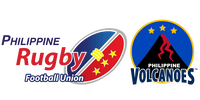
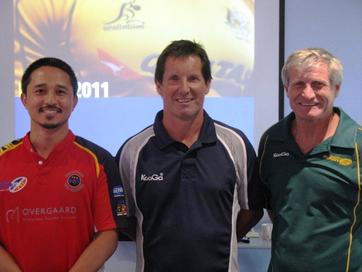
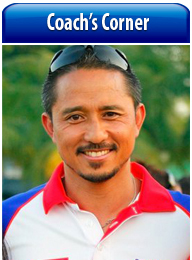
 RSS Feed
RSS Feed
